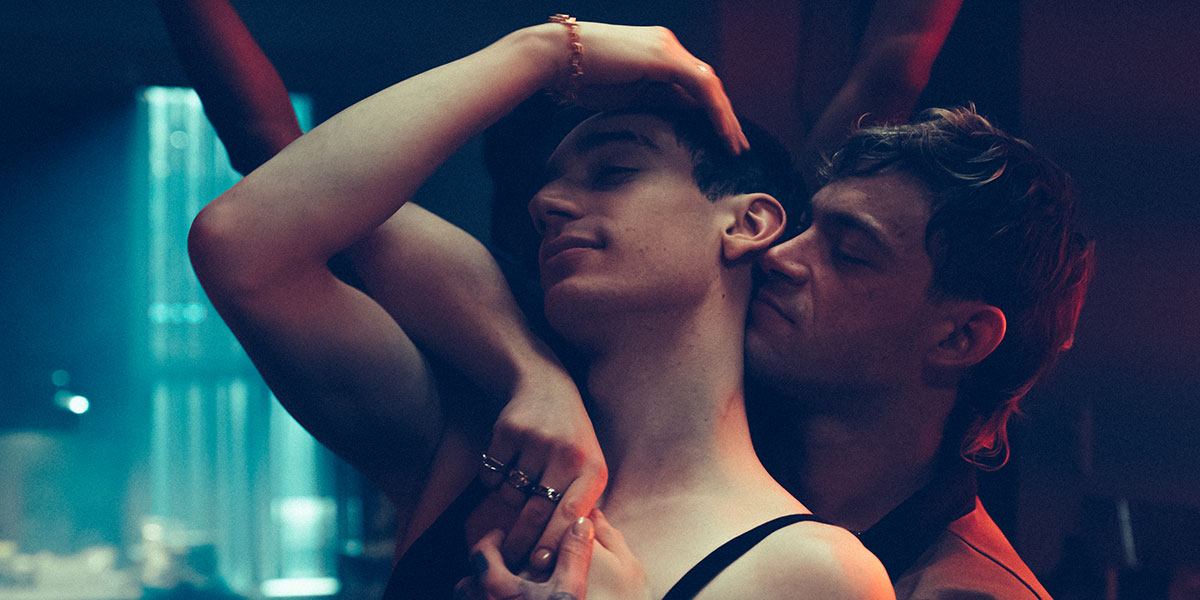Québécoise Director Sophie Dupuis’ third film focuses on Simon (Théodore Pellerin), a makeup artist by day and a drag queen by night. Simon’s life has a comfortable rhythm: nightly gigs at a Montreal gay bar, performing and partying with a tight-knit crew of fellow queens, regular weekend brunches with his supportive dad and step-mom, and days spent dreaming up new outfits with his sister, a costume designer and his closest confidante.
All this changes with the arrival of Olivier (Félix Maritaud), a drag performer from France who joins the coterie of queens at Simon’s regular bar. Olivier and Simon fall quickly into an all-consuming relationship, spending all their time together and planning elaborate duets for their nightly sets. The sweetness of new love begins to sour, though, when Oliver starts behaving in increasingly controlling and manipulative ways that Simon refuses to recognize. Further complicating things is the return of Simon’s mother, a flighty, absent woman who left years ago to pursue a global career as an opera star. Increasingly at the whims of these two larger-than-life personalities, Simon finds himself losing confidence, confidantes, and control of the career he’s worked so hard to build.
What worked well in Solo was the acting. The performances are good across the board, and Félix Maritaud is excellent as Olivier. It’s the closest thing to a villain role that Solo has: Olivier is manipulative, running cold one second and hot the next, slowly pushing Simon to silo himself from all his support systems and then using this against him. He’s not a nice guy. At the same time, Maritaud captures his charm and all the ways he can be fun and sexy and sweet. While I spent a good portion of this film wanting to scream at Simon to get out of this relationship, Maritaud’s performance as Olivier makes you understand why it’s so hard for him to do that. The real knock-out here, though, is Théodore Pellerin as Simon. Over the course of the film, Simon makes many poor decisions. He’s cruel and insensitive to people who love him and keeps returning to people who’ve been unkind to him. But while I often felt frustrated by this, I never lost empathy for him, and that’s a credit to Pellerin, who beautifully conveys the character’s complications: his hope, his vulnerability, his good heart and capacity for love, and his capability to sometimes be careless with the people he cares for. Watching him, it’s not so hard to imagine that you could find yourself in a similar situation.
The fact that Solo centres around a queer couple also adds an interesting dynamic to the central relationship. I’m not a gay man, and I’ve never been in a gay relationship, but as a queer person who spends time in queer spaces and with other queer people, including gay men, there are things I recognize here that feel particular to the queer experience (or, at least, some queer experiences). For example, when Simon expresses discomfort at Olivier hooking up with a mutual friend, Olivier sneers at Simon’s desire for monogamy as immature. “We’re not twelve,” he scoffs, and an embarrassed Simon pretends he’s fine with it. This brought to mind conversations I’ve had with friends, about how sometimes amongst queer folks, non-monogamous relationships can feel like they’re put on a pedestal as a more “progressive” or “evolved” way to love. More broadly speaking, stories about abusive relationship dynamics have been around for ages, but we don’t have that many that examine what they can look like in queer relationships. While films about healthy queer love might be more fun and uplifting, films that look at the thornier side of things are important, too.
The one place this film, and the performances, fell flat for me was in the drag sequences. For the main roles in Solo, Sophie Dupuis prioritized casting folks with acting experience. As I’ve just spent the past paragraph praising the acting, you could argue that the decision paid off, and I would mostly agree. However, the trade-off was that some of these actors had little to no drag experience prior to filming. When it comes time for these actors to take to the stage as their drag counterpoints, they do a perfectly serviceable job – none of it is bad – but the performances lack the spark that great drag shows have. I found this to be especially true of most of Olivier and Simon’s duet numbers. These performances were supposed to communicate the chemistry and electric energy these two have together, but instead read to me as a bit boring, and certainly less fun than the solo numbers Simon was performing at the beginning of the film. Perhaps most unfortunately, the actors’ lack of drag experience ends up hampering the emotional impact of a few big moments in the film that centre around drag performances. Alas, it’s not a slay. Outside of those sequences, though, this film is an electric and empathetic portrait of a character caught in toxic relationship dynamics. My recommendation? Go see Solo, then hit up your local gay bar for a real drag show.









